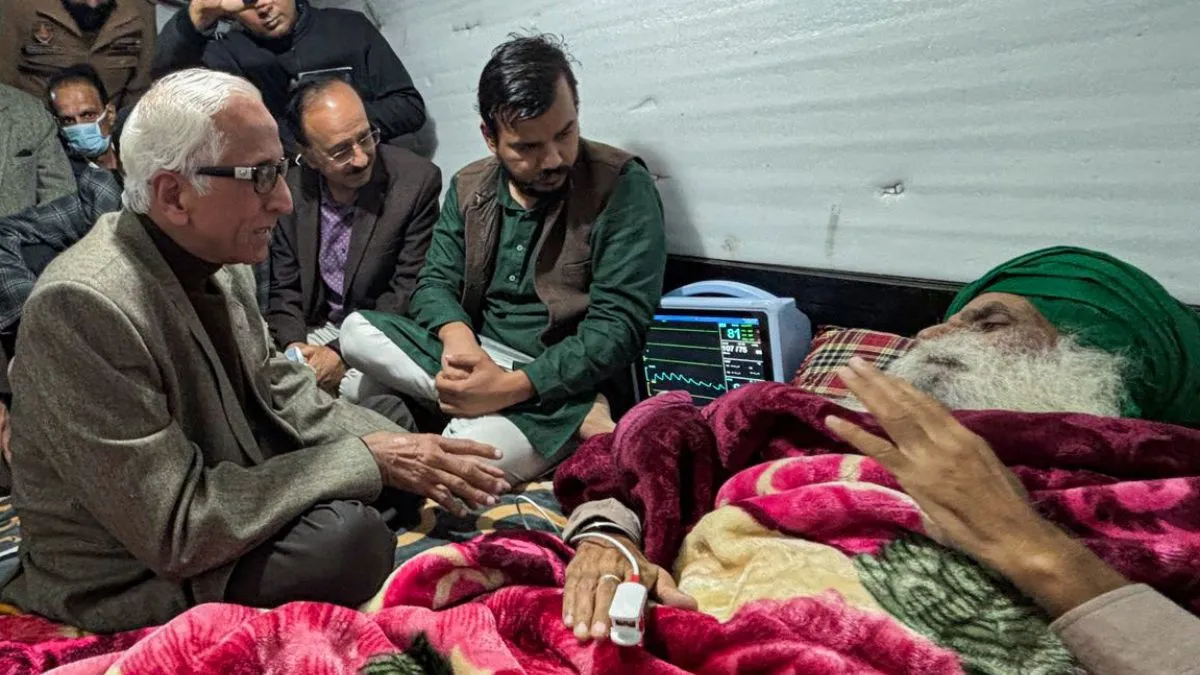- By Abhishek Sheoran
- Tue, 07 Jan 2025 11:02 AM (IST)
- Source:JND
Farmer leader Jagjit Singh Dallewal, who has been on an indefinite hunger strike, suddenly fell ill due to low blood pressure at midnight on Monday. Doctors present at the scene swung into action and provided aid to him by massaging his hands and feet. After about an hour of intense efforts, his condition returned to normal. It was reported that his blood pressure had dropped to 80/56, but it gradually increased to a more stable level, as per Jagran.com.
Dallewal has been holding a protest at the Punjab-Haryana Khanauri border for 43 days over farmers' various demands, including a legal guarantee on the minimum support price (MSP) for crops.
Dallewal’s Blood Pressure Continues To Fluctuate
Dr. Preetpal, the leader of Dr. Swaiman's medical team, reported that Dallewal's condition started deteriorating around 7:00 pm on Monday. Since then, his blood pressure has been fluctuating. The doctors continue to monitor his condition closely. To control his blood pressure, his feet are often raised, and they are massaging his feet continuously.
Supreme Court Committee's Visit
On Monday, the Supreme Court's high-power committee met with farmer leader Dallewal. During the meeting, Dallewal stated that if the central government accepts the farmers' demands, he would not need any medical treatment and would immediately end his hunger strike. Due to this meeting, the Supreme Court postponed the hearing on the farmers' issue that was scheduled for Monday.
After the meeting with Dallewal, Justice Nawab Singh mentioned that the committee members had wished him well on the occasion of the 10th Sikh Guru, Guru Gobind Singh Ji's Prakash Utsav (birth anniversary).
Dallewal’s Fast-Unto-Deaths Now Among The Longest In India’s History
Dallewal’s indefinite hunger strike is now among the longest fast-unto-deaths in Indian history. Mahatma Gandhi went on hunger strikes for over 20 times during India’s independent struggle. His longest hunger strike lasted up to 21 days.
The first significant fast-unto-death protest in independent India occurred in 1952 when Potti Sriramulu embarked on a hunger strike demanding the creation of a separate state of Andhra Pradesh from the Madras State. After 58 days of fasting, Sriramulu's death ignited widespread unrest and violent demonstrations. The intensity of these protests ultimately forced the government to accede to the demand, leading to the formation of Andhra Pradesh as a distinct state in 1953.
Following this, Sikh leader Darshan Singh Pheruman fasted unto death over the inclusion of Punjabi-speaking regions, including Chandigarh, in Punjab after the separation of Haryana and Himachal. Pheruman died after 74 days.
West Bengal Chief Minister Mamata Banerjee went on a hunger strike against land accusations by the Left government for the Tata Nano plant. She called off her protest after 25 days upon request by the then President Abdul Kalam and former PM Manmohan Singh. The project was eventually scrapped.


